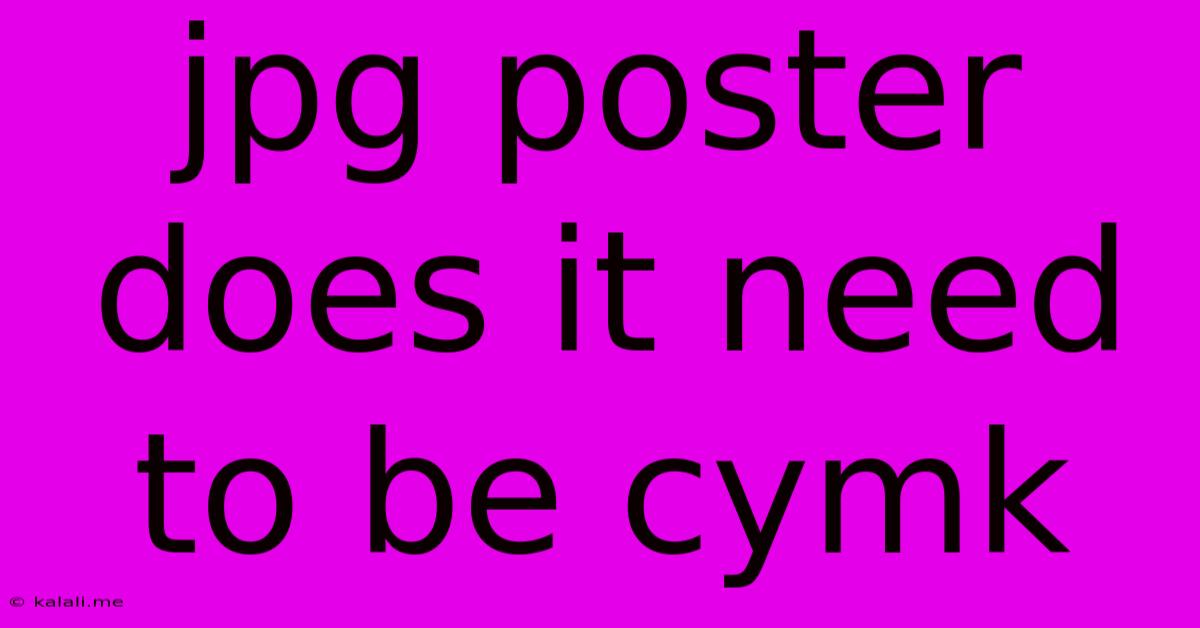Jpg Poster Does It Need To Be Cymk
Kalali
Jun 01, 2025 · 3 min read

Table of Contents
JPG Posters: Do They Need to Be CMYK? The Definitive Guide
Meta Description: Need to create a JPG poster? This guide clarifies the CMYK vs. RGB debate for JPG poster creation, offering practical advice and best practices for optimal print results.
Creating a poster that pops requires understanding the nuances of color profiles. One frequent question revolves around whether JPG posters need to be in CMYK (Cyan, Magenta, Yellow, Key/Black) or RGB (Red, Green, Blue). The short answer is: it depends, but for most scenarios, RGB is perfectly acceptable for digital JPG posters intended for online use, while CMYK is generally preferred for print. Let's delve deeper.
Understanding RGB and CMYK
Before diving into the specifics of JPG posters, it's crucial to understand the difference between RGB and CMYK color models:
-
RGB: This additive color model is used for screens, including computer monitors, smartphones, and televisions. It mixes red, green, and blue light to create a wide spectrum of colors. JPGs designed for online viewing should almost always be in RGB.
-
CMYK: This subtractive color model is used for printing. It works by subtracting colors from white light using cyan, magenta, yellow, and black inks. The result is a printed image. CMYK is the standard for print publications, including posters.
JPG Posters for Digital Use (Online)
If your JPG poster is destined for online use – websites, social media, digital displays – then using RGB is recommended. Most digital platforms are optimized for RGB, and converting to CMYK unnecessarily can lead to color shifts and a less vibrant final product. Stick with RGB for the best online viewing experience. Your JPG will look exactly as you intended it to be seen on screens.
JPG Posters for Print
When preparing a JPG poster for print, the situation is a bit more complex. While many print shops can handle RGB files, converting your JPG to CMYK before submission is generally the best practice. This ensures that the colors translate accurately during the printing process. Inconsistencies can occur if the print shop performs the conversion – often leading to less precise color reproduction.
However, the file format itself (JPG) isn't the primary determining factor for print quality. The crucial aspect is the color profile. While a CMYK JPG is preferred, higher-quality print results often come from using a different file format like TIFF or PDF. These formats can embed color profiles, preventing color mismatches. Consider these options for superior print accuracy.
Best Practices for JPG Poster Creation
Regardless of whether your poster is for digital or print use, these best practices will ensure a high-quality result:
- High Resolution: Use a high-resolution image to avoid pixelation. The resolution needed depends on the intended print size. Larger posters require significantly higher resolutions.
- Color Accuracy: Use a calibrated monitor for accurate color representation throughout the design process.
- File Size: Keep your JPG file size manageable, but don't compromise image quality. Use appropriate compression techniques.
- Test Prints: Always conduct test prints to ensure the colors and quality are to your satisfaction, especially before a large print run.
Conclusion
The choice between RGB and CMYK for your JPG poster depends entirely on its intended use. For digital use, RGB reigns supreme. For print, although a CMYK JPG is usually sufficient, consider TIFF or PDF files for optimal color accuracy. Remember to always prioritize high resolution and conduct test prints before mass production. By following these guidelines, your JPG posters will always look their best.
Latest Posts
Latest Posts
-
How To Get Perfect Pelts Rdr2
Jun 02, 2025
-
Multi Part Identifier Could Not Be Bound
Jun 02, 2025
-
Circle Has How Many Sides And Corners
Jun 02, 2025
-
Isosceles Triangle Inscribed In A Circle
Jun 02, 2025
-
Water Heater Running Out Of Hot Water
Jun 02, 2025
Related Post
Thank you for visiting our website which covers about Jpg Poster Does It Need To Be Cymk . We hope the information provided has been useful to you. Feel free to contact us if you have any questions or need further assistance. See you next time and don't miss to bookmark.